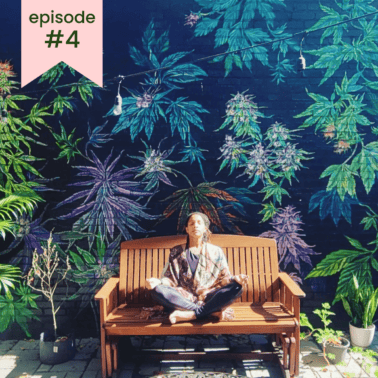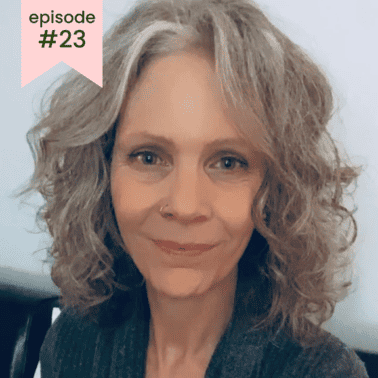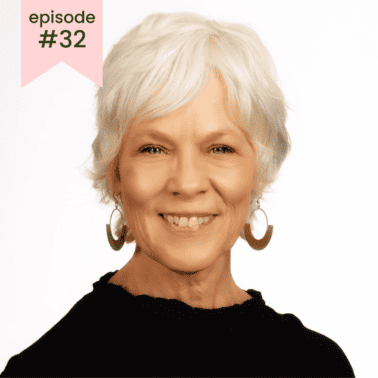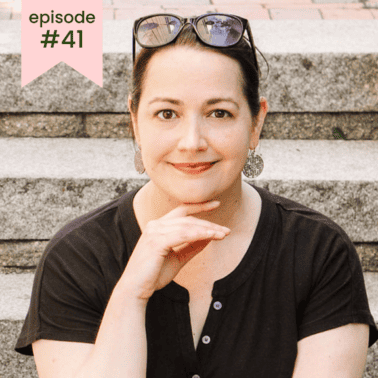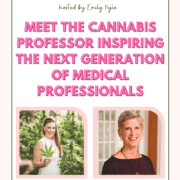This is a special episode with my real-life dietitian role model, Janice Bissex, a pioneer in the field of cannabis. Here we explore the potential benefits of cannabis and CBD, learn about Janice’s incredible work as a registered dietitian turned cannabis professor, and discuss how you, too, can take control of your own health and well-being with the plant.
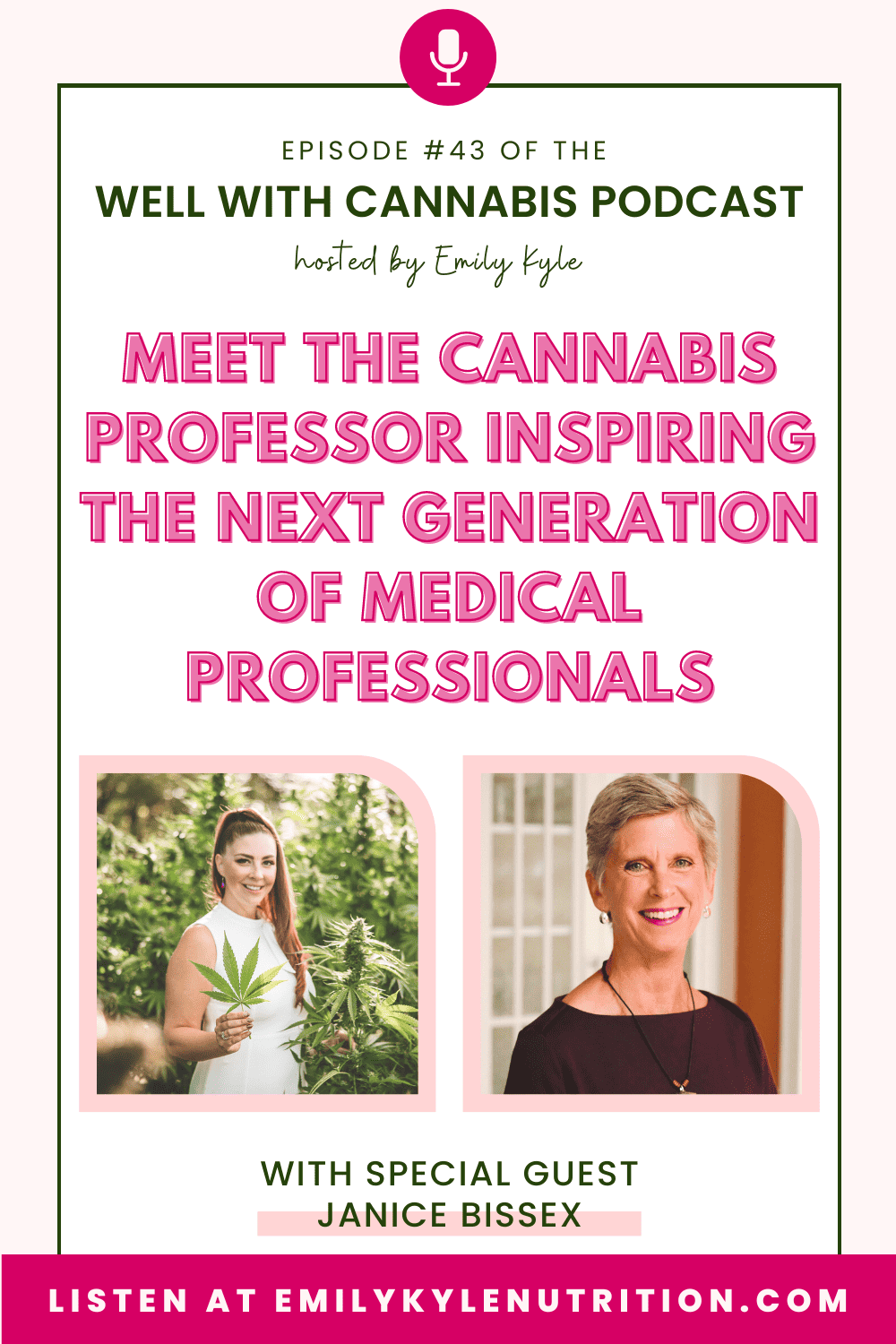
Table of Contents
Features
- Release Date: Wednesday, August 23, 2023
- Episode Number: Season 1, Episode 43
- Special Guest: Janice Bissex, founder of Jannabis Wellness
Listen To The Episode
Click the play button above to listen to the episode.
Listen to all podcast episodes →
Why You Will Love This Episode
In today’s episode, I spoke with Janice Bissex, a Holistic Cannabis Practitioner, Registered Dietitian Nutritionist, and published cookbook author.
Janice’s journey into the world of CBD and cannabis therapy began when her dad found relief through medical cannabis. Inspired by this experience, Janice made it her mission to help others achieve similar relief and well-being.
Janice’s expertise in cannabis therapy is backed by her training as a registered dietitian and certification through the Holistic Cannabis Academy and the Cannabis Fundamentals Certificate Program at GreenFlower.
Her dedication to educating others led her to become the Program Director of Cannabinoid Medical Sciences at John Patrick University School of Integrative and Functional Medicine.
As an advocate for CBD and cannabis therapy, Janice has authored two informative books. Her first book, Simple Guide to CBD: Fact, Fiction, and a Path Forward provides consumers with valuable insights into the potential benefits of CBD and cannabis therapy.
Her second book, Simple Guide to Cannabis Gardening: From Seed to Weed, empowers individuals to grow their own medicinal plants.
Join us as we hear about Janice’s inspiring journey, her expertise in cannabis therapy, and her passion for empowering individuals to take control of their well-being.
Full Transcript
Janice: Don’t believe the lies, Do some research, girl; you’ve been told all your life that this is a gateway drug. It’s not a gateway drug. It’s an exit herb, an exit from pain, anxiety, and all sorts of issues.
Announcer: Welcome to the Well With Cannabis Podcast, a show dedicated to telling the life-changing stories of those who live well with cannabis all while teaching you how to do the same. Meet your host, Emily Kyle, a registered dietitian nutritionist turned certified holistic cannabis practitioner. Emily changed her life for the better with the help of the cannabis plant, and now she’s committed to helping others do the same.
Tune in each week to hear heartwarming stories and gain the knowledge you need to feel connected, inspired, and supported on your own cannabis journey. Whether you’re a new cannabis consumer or a lifetime lover, you’ll benefit from these uplifting tales of real-life journeys that will show you how you, too, can live your best life well with cannabis.
Disclaimer: Hi there. Before we jump into today’s episode, I wanted to share a note on potentially sensitive content. The episodes on the Well With Cannabis Podcast are created for adult audiences only. We will, at times, cover sensitive topics, including but not limited to suicide, abuse, mental illness, sex, drugs, alcohol, psychedelics, and the obvious use of plant medicine. Explicit language may be used occasionally. Please refrain from watching or listening to the show if you’re likely to be offended or adversely impacted by any of these topics.
The information on this show is for informational and educational purposes only. It does not constitute medical advice. If any of the content on this podcast has brought up anything for you, please reach out or speak to a professional or someone you trust.
Emily: Hello, everybody, and welcome back to a very special episode of today’s podcast, the Well With Cannabis Podcast. I’m here with what I consider probably the most special guest I could have, Janice Bissex from Jannabis Wellness.
Emily: I want to get you to know her, but I first want to tell you all how much it means to me to have her here on the podcast because, if you guys don’t know, I’m a registered dietitian nutritionist by trade before I started working in cannabis and Janice is also a registered dietitian nutritionist.
Emily: She’s the very first dietitian that I ever saw working in cannabis, and it changed my life, my career. I think of you; I put you on a pedestal. If it wasn’t for you, I wouldn’t be me. I wouldn’t be here. We wouldn’t be having this conversation. So I hope you know how much it means to me to have you here today.
Janice: Oh, thank you so much. It’s such a pleasure to be with you. We’ve known each other for years and it was so fun to talk about this and then to see where you’ve taken this. You’re a rock star. It’s awesome.
Emily: Thank you so much. But like I said, I would have never in a million years even considered what we do today as an option. When I first became a dietitian, I hid the fact that I used cannabis like it was my job. God forbid if anyone found out during my internship or anything, I thought my life would be over, my career would be done, That would be it.
Janice: Sure.
Emily: And then I don’t know where we were, but I saw you were talking about CBD. For a while, you were the Meal Makeover Mom; you were something very traditional. And then I saw you working in CBD and had a chance to meet you. We met at FNCE. It just opened up my whole world and changed everything. So thank you for being so brave and then coming here to talk about how this all happened for you as well. I’m going to give you the floor. I’m going stop talking. I want to learn more. Did you get into cannabis because of your dad?
Janice: Yes.
Emily: I’d love for you to talk a little bit about that with us.
Janice: Sure. When I grew up, I was told cannabis, marijuana, is a gateway drug and to say no. I bought into that. And so fast forward. I tried it in college, and we didn’t cross paths again with this plant because I had the stigma that still a lot of people have. And then, when my dad was in his 80s, he had some very severe pain. So the doctors gave him what? Opioids, right? He hated opioids. They made him groggy and tired.
Janice: He was a very active man, and they made him so constipated that it required a three-day hospital stay. Now, we’re dietitians, but we’re not going to talk about that. We’re not going into detail. It was awful. So at the end of this hospital stay, I asked his doctor if there was anything else we could do for his pain.
Janice: I brought up medical marijuana because it had just passed in Massachusetts. Now, again, I knew nothing about this. And honestly, I’m not going to lie. I used to say “medical marijuana” using air quotes because I didn’t understand. So when his doctor told me that medical marijuana was a great idea, I thought, “Oh, yes, I’m going to do some research,” as every good dietitian would.
Janice: I did research, and the more I read, the more I thought, “You’ve got to be kidding me.” This plant has been used medicinally for thousands of years. It’s been illegal for about 80 years, not because of science or medicine, but because of politics, greed, and racism, period. I knew we had to try it.
Janice: I had to convince Dad and Mom, and we tried it. And I took Dad to the dispensary. He was in excruciating pain, got home, tried to figure out how to screw the vape pen and click it five times. He took a couple of puffs, stood up, and announced that he would take a nap. And when he stood up, he said, “Wow.”
Janice: I asked him if he was in pain or dizzy. He told me that he wasn’t in pain! I couldn’t believe it. That day, I left my business of 15 years as a Meal Makeover Mom.
Emily: I didn’t know that.
Janice: Yes. I taught people how to eat a healthy diet, as a lot of dietitians do, and I went back to school. I did pursue training and got certified as a holistic cannabis practitioner. Now that is all I do. It is, and you can probably attest to this, the most rewarding work I’ve ever done.
Emily: I can, absolutely. How were you so brave to make the transition? Because you are a pioneer in our field. You were the first one I have ever met to even say the word cannabis, and I have to imagine that was probably difficult.
Janice: It was a little bit. When I went to FNCE about seven years ago, I made up little business cards that said “Cannabis Janice”.
Emily: I remember. Very clever.
Janice: And I got a little bit of interesting feedback. One of my good friends, whom I love dearly, gave me some really good advice. She told me that she loved what I was doing but that I might want to change my name from Cannabis Janice. Since all of my friends were calling me Jannabis, I changed the name to Jannabis Wellness. I did get pushback from fellow dietitians who told me that cannabis isn’t in our scope of practice. Who will educate people if we don’t? Doctors aren’t learning about this in med school at all. Only 15% of med schools talk about the endocannabinoid system.
Emily: I’m surprised it’s even 15%.
Janice: I know. That is, that’s negligence as far as I’m concerned. They need to know this, even if they don’t believe in it. It’s science; there’s not really any belief in it. This is science. There is plenty of evidence. Our government has a patent on CBD as an antioxidant and neuroprotectant. There is so much evidence about this medicine that doctors, dietitians, and nurses need to know about. That’s one reason I’m excited about working at John Patrick University. I’m teaching cannabis therapy to health practitioners.
Emily: That is one of the most amazing things! I would love to talk about that because, for a healthcare provider or practitioner, does it get any better than that? You are doing such huge work teaching our next generation of health educators. Tell me more about what that looks like day to day and how it feels.
Janice: The university has a Master’s Degree in Integrative and Functional Medicine. I don’t know about you, but in my training, we didn’t learn about integrative and functional medicine. It was very clinical. Even my Master’s degree was a repeat of my undergraduate. I learned about the Krebs cycle again. I didn’t learn about food as medicine, about plant medicine, all these things that now, as an older dietitian who’s been in the field for a while, I wish I had learned this decades ago, but I’m a little late, or I guess we’re all a little bit late to the game.
Janice: When the university reached out and told me that they wanted to start a concentration in cannabinoid medical sciences, I wondered if it was a joke. The Dean reached out on LinkedIn, and I didn’t reply because I thought that it just didn’t seem real. It’s been about three years, and I teach cannabis therapy. I have other professors, nurses, and pharmacists who are also teaching as faculty, and we teach, as you said, the next generation of practitioners. I have doctors, nurses, and dietitians in my class. It’s just so interesting.
Janice: I have a nurse now who’s about in his 40s, and he wrote a post this week that said that we’re missing the generational knowledge, the cultural knowledge on cannabis. We’ve missed that for the last eight decades because it was taken from us. So there’s no one to say, “This is what works for me. This is what might work for you,” which makes our role even more important.
Emily: Absolutely. Because so many people are scared of cannabis. First, it’s always been scary because no one’s ever talked to them about it in a positive or helpful light. You’re multiplying the amount of people that you’re helping through your work because you’re shaping the minds of these healthcare providers. I think that is so beautiful. Do you see a lot of minds changed with your work or people hesitant at first?
Janice: The students in my program have bought into it because they’re in there. You’ve done a lot of scientific writing, and the more we write and give talks, the better I feel about what we’re accomplishing. It’s all about education. I wasn’t educated in this, so I understand the stigma because I was there six or seven years ago.
Janice: Coming from that background, I have a little empathy for people who don’t get it. They shouldn’t get it because they’ve never been taught. You have to start people where they are, so a lot of my clients start with CBD because it’s a little less intimidating. If they don’t get relief for their symptom or condition, we add a microdose of THC.
Janice: If they don’t get the degree of relief for their symptom or condition, then we add a microdose of THC and let them know that it’s not going to get them stoned. Many of my clients are older, but I do have a few teenagers and a six-year-old. We start with 2.5 mg and work our way up until we find the relief they’re looking for.
Janice: A woman in my yoga class told me that when she went to a dispensary, they sold her a chocolate bar with 25 mg of THC per square and told her to eat a square to help her sleep. I let her know that it certainly would help her sleep, but she may sleep for a little longer than she’d like. We know that nobody’s ever died of a cannabis overdose, but it can be extraordinarily uncomfortable for a newbie if they take too much.
Emily: And it can turn people off from ever trying it, which is my biggest concern because I don’t want people to be like, “I was in college, and I ate a brownie. It was the worst experience of my life. I’m never going to do it again.” When you use it correctly with the education behind you, it can be so beautiful, safe, and beneficial that it can improve your overall quality of life. You have to be smart about it, and that’s why your work also with cannabis wellness is so important. You hold hands, and you babystep with people, and for people who are new to cannabis, that is so important because just jumping in head first is not right for everybody.
Janice: Exactly.
Emily: So what does the work look like if someone comes to JannabisWellness.com? What does that look like? Can they work with you? How do you work with people?
Janice: Sure. Yeah, they can set up a consultation, and I give them an intake form to get some background information: about their condition, and the medications because we have to be careful with certain medications with potential interaction with CBD or THC. So I look at that and then work together to figure out how to help you.
Janice: And again, we usually start with CBD, and then we progress depending on their condition. I have a woman who has been on Percocet for 15 years, every day, multiple times a day. Now she doesn’t use any Percocet at all, and she uses CBD. She hasn’t even needed to progress to THC, and she’s finding adequate relief. She’s more mobile. It’s so heartwarming.
Janice: I saw a woman yesterday in a coffee shop, and a friend introduced us, and she said, “Oh, you’re Jannabis Wellness! You have helped my dad. He had excruciating arthritis in his neck and is so happy now. He’s in so much less pain.” It’s so rewarding when we can touch people’s lives.
Emily: It makes this work feel so rewarding. Part of me doesn’t identify as a registered dietitian anymore, and part of me does because I think dietitians are uniquely crafted to be the cannabis educators of the world.
Janice: Agreed. Agreed.
Emily: But I also feel like a lot of people think that cannabis is the answer, but we know that it’s just a tool in our tool belt. We have so many other tools that you probably work with your clients. What do those other tools look like? And how do you make it a full picture?
Janice: You have to look at the whole picture like you said. Lifestyle. You look at whether or not they’re exercising or getting some downtime. The endocannabinoid system is influenced by what we eat and our stress levels. I try to work with people and look at how they can feel better, whether through exercise or a proper diet; maybe they need some more vitamin D, some omega 3, or more fish in their diet. We look at their sleep.
Janice: We don’t just give them THC, although it can be very helpful. Screen time, turning off the screen, having a bedtime routine, all those things that we can help them with. Some people can meditate. A lot of people are intimidated by meditation, so my advice is to take ten slow, deep breaths a couple of times a day. That’s enough to calm your body, it affects the vagus nerve, and it just is enough to give them a little bit of relaxation, even if they can’t “meditate”.
Emily: I don’t know if you find this, but I find this a lot is that when people start using cannabis. They start this whole health journey they didn’t intend to set on. So they might fix the immediate issue, whether it’s pain or anxiety or something like that, but then they find all of these other really amazing things that cannabis can do.
Emily: It can make you feel more active. It can help you sleep better. And it just feels like it rolls into this snowball of wellness, and yeah. I think Dr. Ethan Russo said that the endocannabinoid system truly is the center of the mind-body connection. And when you think about it that way, it makes so much more sense why people see this improved quality of life in so many different facets.
Janice: Absolutely. Agreed.
Emily: So, moving into the future, are you feeling hopeful for our healthcare professionals, and obviously you’re educating them, so I hope so. But where do you see us moving forward?
Janice: I think it’s baby steps. I think part of the piece of the puzzle is that we need to legalize this plant. You and I know a lot of the reasons why it’s still illegal.
Janice: The pharmaceutical companies stand to lose a lot of money when cannabis becomes legal federally because people will find that they can find relief in something other than pharmaceuticals. They will lose money, so they’re working very hard behind the scenes to keep it illegal.
Janice: There are a lot of other factors at play. Private prison systems make a lot of money by imprisoning people for cannabis possession. It’s just a tragedy that we have people of color in particular, who go to jail for decades for having a joint in their pocket. It’s tragic. It really is.
Janice: I think that we’re getting there. We need to legalize it; then, we can do more robust research. Now, we do have research. There are people who say there’s not enough research. Come on. There are thousands and thousands of clinical trials, but we do need more. We absolutely need more, and some trials are with rats and animals, but we need human clinical trials.
Janice: Our government has enough trials and research to say it’s good for pain. The national institutes and national academies have come out to say cannabis is effective for pain. That’s pretty huge for them to say that. There have to be significant results for them to say that.
Emily: To think about the Schedule 1 classification just kills me. I can’t believe that. And I guess 1 thing I didn’t always realize is that when they made it a Schedule 1 it halted all research and no research can go forward. Sometimes I can’t believe we live in 2023.
Janice: I know. I am hopeful. Every year I say, “Okay, maybe this year it’ll become legalized.” I do feel that we’re inching closer. For example, it’s hard for me when I work with someone with breast cancer in Georgia. It’s illegal in Georgia, so I help them and say, “I can’t look at your local dispensary to help you figure out what to buy because you can’t.” So then people are forced to have friends in other states get their medicine for them.
Emily: Crazy. Or I have a lot of folks down in Texas who resort to D8 products because that’s what’s available. D8 is a Delta 8 THC, but it’s synthesized for anybody listening. It’s not the way it is in products right now. It’s not naturally occurring. The way they make it, there are no safety regulations, and it has made people sick. But I have people in Texas who say they’d rather take the chance and have nothing at all. And that just kills me.
Janice: That’s the position we’re putting them in. Absolutely. And they can’t access Delta 9, which is natural and has been used for thousands of years. We have lots of safety information on that. So that’s a problem.
Emily: Yeah. But we are moving forward. We’ve seen a lot of progress in the last couple of years. And then, when I think about the work that you’re doing, it gives me so much hope and joy because you really are influencing the most powerful influencers who are going to go out and change how they talk and treat their patients.
Emily: And ultimately, that’s going to make such a difference for people. I know many people terrified to discuss cannabis with their doctors.
Janice: Exactly. Even those using it effectively medicinally are too afraid to talk to their doctor, of course. And I just was listening to a webinar last night, and they were talking about how a pregnant woman if she tests positive, it’s like a big, huge deal in the hospital. And Dr. Sulak, who I’m sure you’re aware of in Maine, is a great cannabis doctor. He reaches out to the doctors of either a pregnant woman or anyone going in for surgery and helps them understand that their patients are using cannabis medicinally. It’s helpful, but it’s a big deal if a pregnant woman goes in and tests positive.
Emily: It can have huge consequences, especially in those states that are not cannabis friendly. We’re talking about CPS coming to your house over using something that’s safer than the options they offer you.
Emily: On a personal tangent, I was pregnant 18 months ago. I had my baby in New York state, and they wanted to know I had my medical card. I’m not sure what they would do if I didn’t have my medical card, but they wanted to see it in the hospital when my baby was born. And I was like, “Thank God I have my medical card.” I don’t know what it would have looked like otherwise. And I’m in New York State. Imagine what it’s like in Texas, Alabama. I just, it’s crazy.
Janice: Yeah, it really is. It’s unfortunate. And again, that’s why we need to legalize this federally so that people aren’t put in that position.
Emily: Do you have any advice for someone who might want to talk to their doctor because that’s obviously the right thing to do but is scared about bringing that up with a health care provider?
Janice: Yes, I would say that you should bring it up and say, “I am using this successfully to help with my X, Y, and Z.” And if the doctor freaks out, then I think it’s time to get a new doctor.
Emily: Thank you! Yes, we are not bound. We are customers in the healthcare system. You can find somebody else.
Janice: And, I tell some of my clients that they might want to bring a couple of research studies with them, like the study that showed for inflammatory bowel disease, 45% went into remission using cannabis. How can a doctor not look at that and say, “Gee, maybe I should learn a little more about this.”
Emily: Maybe you’d be the right person to ask about this. Are doctors prohibited from advocating for cannabis or not? I’m never quite clear on how that works.
Janice: I don’t think they are, I think some of them think they are, but I don’t think they are. They can’t always just come out and recommend that a patient use cannabis, but they can tell a patient that others have had success using cannabis or CBD to manage their condition and even that it’s something given at the end of life.
Janice: I’m so passionate about that, and honestly, if I knew what I know now, my dad’s end of life would have been much more peaceful. I was learning back then, so he used it for his pain. But, when you bring in hospice, they give morphine, which, again, just makes you a little bit of a zombie. So I really regret that. I didn’t know more back then that I could have helped in that area.
Emily: Do you work now with helping people with end-of-life situations? Because I could see how that could be really helpful for a lot of people.
Janice: I don’t do a lot of it. I did my end of life certification at University of Vermont a few years ago after my dad died. I was so passionate that I did get certified. It’s not a big focus. But I have worked with people who are near the end of their lives. So I do some of that. Yes.
Emily: It’s probably such a comfort for folks. A lot of people want what’s best for their loved ones. But if they don’t know what to do, having your guidance probably means the world to them.
Janice: Yes.
Emily: You do such important work. I’m so thankful that our paths have crossed and that you have influenced me to be able to do the same thing and follow in your footsteps. And I want to be respectful of your time, but I also want to ask you the same four questions I ask all of my guests. Are you ready for the first one?
Janice: I’m ready.
Emily: All right. First one. What are you most proud of in your life to date?
Janice: Oh, wow. In my life?
Emily: Your whole life.
Janice: Oh, for goodness sakes. My whole life. I guess I’d have to say my kids.
Emily: You can. Most people say, “My kids,” and then say, “And then…”
Janice: I would say the people that I’m helping. Right now, with my education around cannabis and CBD, I think that is something that I’m proud of, and I’m proud of other work that I’ve done, but this is very different.
Emily: Next question, what do you think your life would look like if you never found or experienced cannabis?
Janice: Wow. It would, I wish I knew then what I know now, but I wouldn’t have this career if I didn’t understand cannabis. I wouldn’t sleep as well because I have started using some THC to help me sleep. I’m new to using cannabis. I taught about it and helped other people, but now I’m like, “Wait a minute, you can use this to help you sleep.” I guess I would not sleep as well. Sleep is precious.
Emily: That’s amazing. Yes. If you could go back 10, 20, or even 30 years ago and give yourself a piece of advice, what would it be?
Janice: It would be: Don’t believe the lies; do some research, girl! You’ve been told all your life that this is a gateway drug. It’s not a gateway drug. It’s an exit herb, an exit from pain, anxiety, and all sorts of issues. That’s what I would have told myself, to look beyond the headlines, if you will.
Emily: Yes, absolutely. Last one. I don’t even think you need to answer this because I feel like I already know. I have a special place in my heart for you. If you could be remembered for just one thing in the cannabis space, what would it be?
Janice: Educating health professionals. That’s my passion. And I see that as right now, that’s my superpower.
Emily: The greatest superpower. Like I said, you are changing so many lives. You’ve personally impacted my life in a really meaningful way. So for having you here, it feels so full circle and special to me. Thank you so much for coming on this show, being an inspiration, and just being who you are and doing what you do in the world.
Janice: Thanks, Emily. And I’m really, I’m so proud of you and the work that you do. I’m just so excited to connect with you again. We see each other at conferences, but it’s also great to see what you have done.
Emily: Thank you. Now, where can people go if they want to learn more about you and Jannabis Wellness?
Janice: JannabisWellness.com (that’s cannabis with a J), and they can get all sorts of information. I have resources, little handouts, and just general information for people.
Janice: I’ve written two books, Simple Guide to CBD and Simple Guide to Cannabis Gardening. I want people to be able to just put a little plant in the ground and watch it grow. You’re the expert in this and I write about you in the book. I direct people to you in that book, too.
Emily: Thank you. I am going to get a copy, but I’ll also leave a link for both of those for everybody listening. Please go get a copy, go to JannabisWellness.com. Thank you for the work that you’re doing. And thank you for being my inspiration.
Janice: Thanks, Emily. It’s a pleasure.
Announcer: Congratulations, you’ve finished another episode of the Well With Cannabis Podcast and are one step closer to discovering how you, too, can live well with cannabis.
Thank you for listening in today. We hope this episode has been a helpful and informative one. Please visit emilykylenutrition.com for more information on today’s show, show notes, guest information, recipes, and other resources.
If you want more support and encouragement on your cannabis journey, please consider joining the private Well With Cannabis Community. In this group, you can connect with like-minded individuals focused on improving their health and wellness through cannabis.
Join the group today to continue your journey of wellness together!
Related Episodes
Podcast Episodes
How to Join the Cannabis Lifestyle Revolution
Podcast Episodes
How This School Teacher Found Holistic Healing with Cannabis
Podcast Episodes

